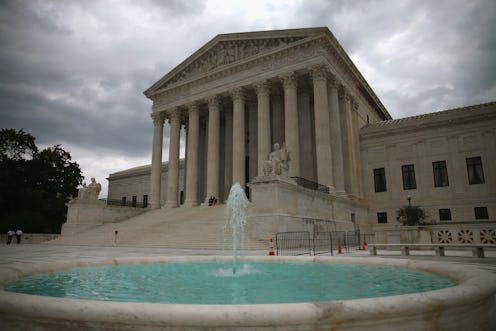News
SCOTUS Decides Whether Facebook Is Free Speech
Perhaps unsurprising for a group whose average retirement age is 78.7, the U.S. high court has a social media problem. Not that Antonin Scalia is tweeting salacious pictures or anything like that, but, rather, social media sites have posed an interesting problem for justices in determining how to interpret the law in a Facebook age. Next week they'll take another stab at it with a Supreme Court case on the limits of social media free speech.
Anthony Elonis lost his job shortly after his wife years took their two children and left him in 2010. He began to post violent Facebook status updates in the form of rap lyrics, which included threatening to kill his wife of seven years, a female FBI agent working on the case, and his former boss. Now, the court will attempt to decide if the updates were indeed viable threats that posed a danger to Elonis' ex-wife and others.
Elonis claims that his postings were a form of therapy, branding them as art rather than true threats. Certainly "art" is a tough thing to question. A five-minute video of Andy Warhol eating a hamburger is considered art. Shakespeare's sonnets are also considered art. But as for Elonis? I see why two lower courts have said his threats were not on par with ol' Willy Shakes. In several 2010 posts, he detailed the brutal murder of wife, Tara Elonis, and when she obtained a protection-from-abuse order against Elonis, he posted this in response:
Fold up your PFA [protection-from-abuse order]
and put it in your pocket
Is it thick enough to stop a bullet?
Try to enforce an Order
That was improperly granted in the first place
Me thinks the judge needs an education on true
threat jurisprudence
And prison time will add zeroes to my settlement
Elonis has served jail time for his threats, his artistic defense thwarted by this federal law: "Whoever transmits in interstate or foreign commerce any communication containing any threat to kidnap any person or any threat to injure the person of another, shall be fined under this title or imprisoned not more than five years, or both."
The idea of what constitutes a threat is in desperate need of updating. The last time it was considered by SCOTUS was in 2003, where it was decided that banning cross burning was unconstitutional, because a threat requires someone to communicate that they intend to commit an act of violence. In that decision, SCOTUS defined a "true threat" as "statements where the speaker means to communicate a serious expression of an intent to commit an act of unlawful violence to a particular individual or group of individuals."
It turns out social media is a little more nuanced than cross burning, which is something I never thought I would need to say. Both parties in this case are asking the judges to remember the unique nature of social media as a form of communication, but it's unclear which side will benefit from those differences between traditional communication and those done through status updates.
Images: Getty Images
